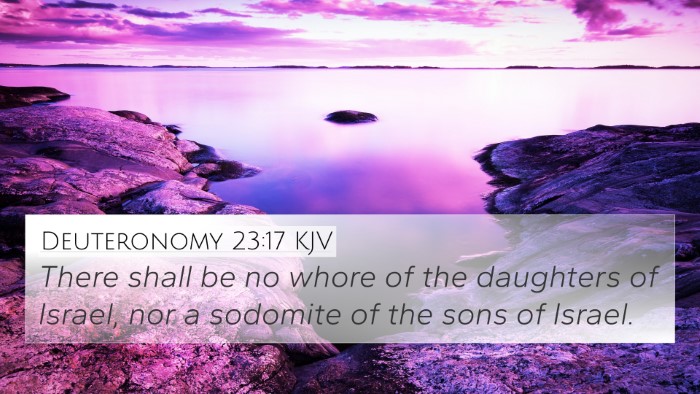Understanding 1 Kings 3:16
1 Kings 3:16 presents a powerful narrative that showcases the wisdom of King Solomon as he navigates a complex ethical dilemma. This event is significant not only for its immediate context but also for its broader implications in understanding wisdom, justice, and the nature of true judgment in Scripture. Below is an interpretation drawn from various public domain commentaries, including those by Matthew Henry, Albert Barnes, and Adam Clarke.
Verse Context and Summary
In this passage, two women come to King Solomon, each claiming to be the mother of a baby. Their dispute regarding the child's identity places Solomon in a position where he must utilize discernment and wisdom to arrive at a just conclusion. The king proposes to divide the living child in half, revealing the true mother through her compassionate response. This narrative is emblematic of how divine wisdom operates in real-world scenarios.
Interpretative Insights
- Wisdom in Leadership: Both Matthew Henry and Albert Barnes emphasize that this story demonstrates the essential quality of wisdom in governance. Solomon’s decision-making process depicts leadership grounded not merely in rules but in compassion and insight.
- The Nature of True Motherhood: Adam Clarke highlights the deep emotional bond between a mother and her child, noting that true love can be discerned through self-sacrifice. The real mother’s willingness to relinquish her claim on the child for the sake of its survival illustrates the profound nature of maternal love.
- Judgment and Justice: The proposal to divide the child serves as a brilliant judicial tactic. It exposes the heart of the true mother and reveals Solomon’s unparalleled wisdom in judicial matters. This approach teaches that sometimes, a question posed in an extreme manner can lead to the uncovering of truth.
Bible Cross-References
Several Bible verses resonate with the themes presented in 1 Kings 3:16, which can enhance understanding through Bible verse cross-references. Noteworthy connections include:
- Proverbs 2:6: "For the Lord gives wisdom; from His mouth come knowledge and understanding." This verse ties into Solomon's wisdom as a divine gift.
- James 1:5: "If any of you lacks wisdom, let him ask of God, who gives to all liberally..." which emphasizes the importance of seeking wisdom from God.
- Matthew 7:2: "For with the judgment you pronounce, you will be judged." This reflects the theme of divine justice and the weight of Kings' decisions.
- Psalm 111:10: "The fear of the Lord is the beginning of wisdom; all those who practice it have a good understanding." This underscores the source of Solomon’s wisdom.
- Isaiah 11:2: Describes the Spirit of wisdom resting upon the Messiah, linking back to Solomon as a type of Christ in terms of judicial and moral governance.
- 1 Corinthians 1:25: "For the foolishness of God is wiser than men…" [Underlining God’s wisdom exceeding human understanding through Solomon’s judgment].
- Luke 7:35: "Wisdom is justified by all her children," which reflects the ultimate vindication of wisdom through the outcomes it produces.
Themed Connections
Consider also the inter-biblical dialogue surrounding themes of wisdom and judgment, where Bible verses that relate to each other enhance our understanding of how Solomon's wisdom manifests. For example:
- Solomon’s request for wisdom (1 Kings 3:5-9) demonstrates his understanding of what is truly valuable in leadership.
- Similar wisdom is illustrated in the parables of Jesus, particularly in the way He addresses complex moral and ethical issues.
- The contrast between wise judgment (1 Kings 3:16) and foolishness in governance can be observed in subsequent kings of Israel who failed to exercise similar discernment.
Cross-Referencing Biblical Texts
Engaging in cross-referencing Biblical texts sheds light on the nature of wisdom throughout Scripture. Solomon's wisdom parallels with:
- The counsel of figures such as Joseph (Genesis 41:46) and Daniel (Daniel 2:48), where inspired wisdom leads to deliverance and understanding during crises.
- This also allows a comparative Bible verse analysis with New Testament teachings that emphasize wisdom, particularly in the teachings of Christ (Matthew 12:42).
- Understanding Solomon's ethical dilemma through these lenses showcases the timeless nature of God's principles of justice and wisdom.
Conclusion
The incident in 1 Kings 3:16 is a rich narrative filled with lessons on wisdom, justice, and the heart of true motherhood. Its implications extend far beyond its immediate context, weaving a web of Bible verse parallels and connections that enrich our understanding of God's wisdom throughout the entirety of Scripture. By reflecting on this passage, believers are reminded of the crucial nature of divine wisdom in our decisions and relationships.









